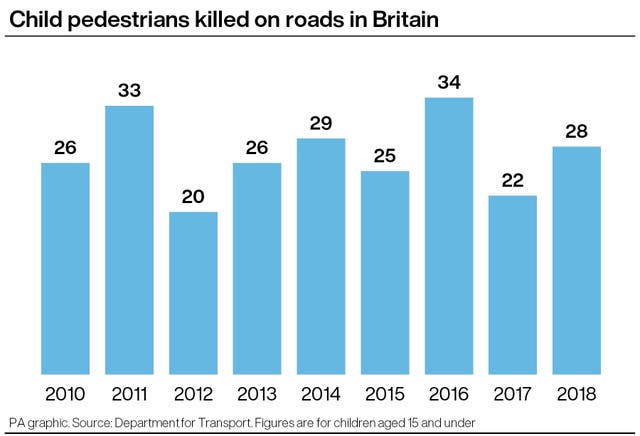“Serious concerns” have been raised about a rise in the number of child pedestrians and older motorists dying on Britain’s roads.
New data from the Department for Transport (DfT) revealed reported road deaths fell from 1,793 in 2017 to 1,784 in 2018, while road casualties fell from 170,993 to the lowest level on record at 160,597.
But the number of fatalities aged 60 and over in reported road accidents rose by 5% from 559 to 588 while the number of pedestrians aged 15 and under who were killed rose by more than a quarter from 22 to 28 during the same period.

The Royal Society for the Prevention of Accidents (RoSPA) said the figures were a “serious concern” and said there was a “lack of significant progress towards reducing road deaths”.
RoSPA is urging the Government to introduce road safety targets to help prevent futures deaths.
Its acting head of road safety Nick Lloyd said: “It is disappointing to see there has been little to no improvement in the number of fatalities on our roads.
“In light of this, we continue to urge the Government to implement road safety targets to help prevent tragedies in the coming years.
“It is particularly concerning to see an increase in the number of older drivers and riders being killed and also a rise in the number of older road users being killed or seriously injured – which was up by 9%.
“Last year RoSPA called for greater emphasis to be placed on pedestrian training for children. This remains a priority for us, as the number of child pedestrians killed in road accidents have risen from 22 in 2017 to 28 in 2018.”
RoSPA concerned by increase in road deaths among vulnerable road users https://t.co/NuyOWfxbO3 @roadsafety #roadsafety #pedestriansafety #childsafety @transportgovuk pic.twitter.com/Q5zARCPrj0
— RoSPA (@RoSPA) September 26, 2019
The new data showed that the total number of child casualties – including car passengers – fell by 9% to 14,266, the lowest year on record
The report also said that the rising number of people aged 60 and over could explain why more elderly people were killed or injured on Britain’s roads.
It added: “This relatively rapidly growing population may partly explain the upturn in fatalities and killed or seriously injured casualties seen for this age group in the last few years.”
The RAC said the new data made “disappointing reading” and that there had been “no meaningful reduction in fatalities” nationally for seven years in a row.
Its head of policy Nicholas Lyes said: “Of particular concern are the rises in fatalities among older age groups and a spike in fatalities on motorways – some worrying trends are emerging here that require immediate investigation, to understand the reasons for these increases and what can be done to reduce them.
“In addition, the Government’s data suggests an increase in motorway collisions where at least one driver has been under the influence of illegal drugs.”
The statistics showed that motorway fatalities had risen by 8% to 107 in 2018, while the number of reported accidents on motorways where a driver had been impaired by illicit or medicinal drugs rose by nearly 50% from 39 in 2017 to 57 in 2018.
Transport Secretary Grant Shapps said: “Any death on our roads is one too many and as these statistics show, there is still work to be done.
“We are progressing more than 70 different measures to help improve safety at pace, for everyone from infants in car seats to those with years of driving experience.
“I have also asked the department to urgently look at technological interventions to help reduce the number of young drivers killed, and I look forward to progress on this work in the coming months.”
